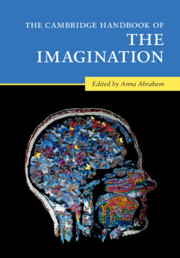Book contents
- The Cambridge Handbook of the Imagination
- The Cambridge Handbook of the Imagination
- Copyright page
- Dedication
- Contents
- Figures
- Contributors
- Acknowledgments
- 1 Surveying the Imagination Landscape
- Part I Theoretical Perspectives on the Imagination
- Part II Imagery-Based Forms of the Imagination
- Part III Intentionality-Based Forms of the Imagination
- Part IV Novel Combinatorial Forms of the Imagination
- Part V Phenomenology-Based Forms of the Imagination
- Part VI Altered States of the Imagination
- 40 Dreaming: Beyond Imagination and Perception
- 41 Dreaming is Imagination Roaming Freely, Based On Embodied Simulation, and Subserved by an Unconstrained Default Network
- 42 Aphantasia
- 43 Hypnosis and Imagination
- 44 Hallucinations and Imagination
- 45 The Psychiatry of Imagination
- 46 Meditation and Imagination
- 47 Flow in Performance and Creative Cognition – An Optimal State of Task-Based Adaptation
- 48 The Force of the Imagination
- Name Index
- Subject Index
- References
47 - Flow in Performance and Creative Cognition – An Optimal State of Task-Based Adaptation
from Part VI - Altered States of the Imagination
Published online by Cambridge University Press: 26 May 2020
- The Cambridge Handbook of the Imagination
- The Cambridge Handbook of the Imagination
- Copyright page
- Dedication
- Contents
- Figures
- Contributors
- Acknowledgments
- 1 Surveying the Imagination Landscape
- Part I Theoretical Perspectives on the Imagination
- Part II Imagery-Based Forms of the Imagination
- Part III Intentionality-Based Forms of the Imagination
- Part IV Novel Combinatorial Forms of the Imagination
- Part V Phenomenology-Based Forms of the Imagination
- Part VI Altered States of the Imagination
- 40 Dreaming: Beyond Imagination and Perception
- 41 Dreaming is Imagination Roaming Freely, Based On Embodied Simulation, and Subserved by an Unconstrained Default Network
- 42 Aphantasia
- 43 Hypnosis and Imagination
- 44 Hallucinations and Imagination
- 45 The Psychiatry of Imagination
- 46 Meditation and Imagination
- 47 Flow in Performance and Creative Cognition – An Optimal State of Task-Based Adaptation
- 48 The Force of the Imagination
- Name Index
- Subject Index
- References
Summary
The term flow originates from studies on what motivates people to devote more time to activities – across both work and play settings – than could be expected based on external rewards such as money or fame. The main underlying reason appears to be the intrinsically rewarding subjective experience of flow. Flow refers to a psychological state of high but subjectively effortless attention, low self–awareness, sense of control and enjoyment that can occur during the performance of tasks that are challenging but matched in difficulty to the skill level of the person. This chapter gives an introduction to flow that focuses on the prerequisites and phenomenology of effortless attention, and how the flow experience relates to perception, cognition, and action. Flow and creativity are discussed in particular detail, centering on three hypotheses of how flow may relate to creative cognition; as a motivating factor for task engagement and skill acquisition, as a feedback signal for optimal task-based adaptation, and as relying on similar psychological and neural underpinnings. Lastly, the need for more basic research and applied research is discussed – the former on the relation between flow states and the quality of creative performance and the latter on how the concept of flow could be implemented successfully in training and education.
Information
- Type
- Chapter
- Information
- The Cambridge Handbook of the Imagination , pp. 796 - 810Publisher: Cambridge University PressPrint publication year: 2020
References
Accessibility standard: Unknown
Why this information is here
This section outlines the accessibility features of this content - including support for screen readers, full keyboard navigation and high-contrast display options. This may not be relevant for you.Accessibility Information
- 1
- Cited by
